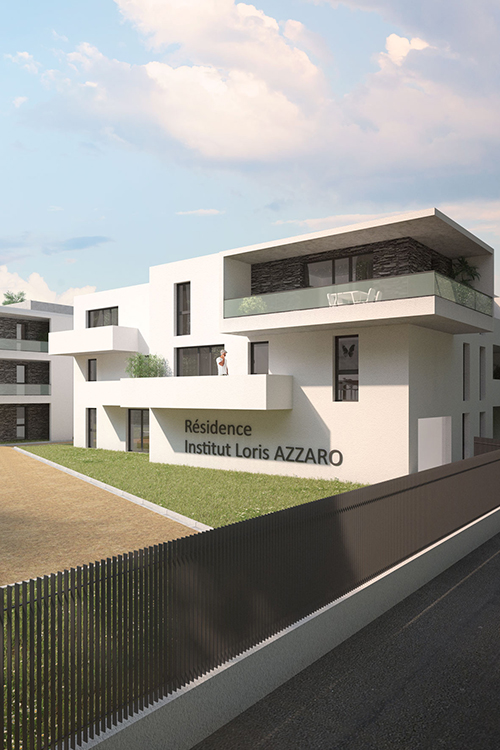The foundation
History
![]()
Loris Azzaro,
visionary creator, committed man and humanist at heart.
Loris Azzaro, a Sicilian born in Tunis, founded the Azzaro brand in 1967. Between Mediterranean sensuality and Parisian chic, his creations are a reflection of the House of Azzaro: luminous, elegant and full of sensuality. The most beautiful women in the world, such as Marisa Berenson, Brigitte Bardot, Claudia Cardinale, Romy Schneider, Raquel Welch and Jane Birkin, swear by Azzaro’s creations to sparkle on the red carpets.
The passing of Loris Azzaro on 20 November 2003 left a huge void. With his early awareness of environmental issues, Loris Azzaro was passionate about fashion but also about nature. Before his death, he had worked on developing the brand to carry out a charitable project, aimed at promoting and defending the environment and he had expressed his desire and determination to do this very clearly.
Inspired by the values of its creator, the foundation “Institut Loris Azzaro”, a not-for-profit organisation, was created in 2006 in Toulouse to carry out actions in favour of development aid and environmental protection. The choice of the la ville rose [Toulouse, the Pink City], the city that Loris Azzaro held close to his heart in which he studied and got married, was one of the creator’s personal requirements.
Loris Azzaro,
visionary creator, committed man and humanist at heart.
Loris Azzaro, a Sicilian born in Tunis, founded the Azzaro brand in 1967. Between Mediterranean sensuality and Parisian chic, his creations are a reflection of the House of Azzaro: luminous, elegant and full of sensuality. The most beautiful women in the world, such as Marisa Berenson, Brigitte Bardot, Claudia Cardinale, Romy Schneider, Raquel Welch and Jane Birkin, swear by Azzaro’s creations to sparkle on the red carpets.
The passing of Loris Azzaro on 20 November 2003 left a huge void. With his early awareness of environmental issues, Loris Azzaro was passionate about fashion but also about nature. Before his death, he had worked on developing the brand to carry out a charitable project, aimed at promoting and defending the environment and he had expressed his desire and determination to do this very clearly.
Inspired by the values of its creator, the foundation “Institut Loris Azzaro”, a not-for-profit organisation, was created in 2006 in Toulouse to carry out actions in favour of development aid and environmental protection. The choice of the la ville rose [Toulouse, the Pink City], the city that Loris Azzaro held close to his heart in which he studied and got married, was one of the creator’s personal requirements.
Loris Azzaro, the visionary …
![]()
“We must give back to Nature what she has given us.”
“Very early on, Loris Azzaro became aware of the ecological urgency; damage to nature and the environment in general would turn against us and very quickly become a global problem.
The idea was to create a foundation in his name, to inform and educate people on protecting the environment.
For years, he travelled the world, opening his eyes to the advancing desert in Morocco, the fragility of coral reefs in the Red Sea, the fragility of the Namib Desert in Namibia, the protection of dolphins in the Caribbean, water pollution and the loss of natural resources, etc.
Being an enthusiastic environmentalist, a committed man with the idea that nature conservation must start from a young age was the key to a sustainable change of vision.
It was under this impulse, in order to be even more effective, that he created the Loris Azzaro Institute.“
Our missions
![]()

Humanitarian Action
The Loris Azzaro Institute is committed to carrying out numerous humanitarian projects throughout the world, such as funding Care Centres in Africa, which promote access to both health facilities and power.
Environmental education
The foundation takes charge of environmental education programmes for children in schools and neighbourhoods in Toulouse, in order to make them aware of environmental protection and make them the eco-citizens of the future.


Eco-construction
Aware of demographic issues, the Azzaro foundation has also defined several real estate projects with an ecological dimension by drawing up a charter “Louis Azzaro Housing Institute”, to plan and design better housing, which will become the housing of the future.
The team
![]()

Jérôme Ducros
President of the Institute since 2018

Fabien Lhuillier
Vice President of the Institute

Belaïd Ouachem
Director of Communication

Jennifer Lozano
Assistant

Thierry Galian
Director of External Relations

Christian Rey
Project Manager
Key figures
![]()
2.1 billion people do not have access to safe drinking water, that is 30% of the world’s population
The world will end in 2050 due to global warming, in less than 100 years civilisation will come to an end
7 deaths are recorded every minute due to unsafe drinking water
There will be an average temperature rise of +13° by 2100, an increase due to the disappearance of clouds caused by global warming
Sea levels will rise by 10 cm impacting 10 million people
925 million people suffer from food insecurity; as a result of climate change, this number could rise to 1.5 billion by 2080
212 days: this is the period during which we consume all the resources that the planet is capable of generating in 365 days
By 2030, 100 million deaths due to disease and famine will be caused by climate change
The Charter
![]()
The preservation of the environment has now become a major issue for the survival of human societies.
The building sector is an important player in climate issues because of its energy consumption and greenhouse gas emissions.
Development of eco-friendly initiatives is therefore a pressing issue.
The Loris Azzaro Institute is an association under the 1901 law and it pays close attention to respecting the environment and quality of life through its purpose and activities.
This Charter is therefore intended to establish eco-friendly criteria when implementing real estate construction programmes, in order to respect the values defended by Loris Azzaro. The Charter sets out a list of economic and technical criteria for designing and constructing environmentally friendly buildings.
These criteria are not intended to replace existing standards, but to add environmental and ecological value to them. Its aim is to unite construction workers from all sectors and of all kinds around a common definition of being eco-friendly and to maintain shared ambitions.
In particular, it:
- Sets environmental requirements for a construction project based on collaborative work and analysis between the different project owners;
- Offers energy-efficient, environmentally friendly construction solutions and high-performance, durable building materials that provide residents with the highest level of everyday comfort.
It is composed of three axes around which the choices to be made when designing a building must be based:
ADAPT
the real estate project to the geographical, environmental, demographic and human context;
OPT
for low-energy and ultimately self-sufficient buildings;
BUILD
high-performance buildings using innovative materials and equipment and offer comfortable use to future occupants.
Resources
![]()
Before his death, Loris Azzaro had clearly expressed his desire to and had already worked on developing his name and eponymous brand to carry out a charitable project aimed at promoting and defending the environment, having always held issues related to respecting nature very close to his heart.
The backbone of Loris Azzaro’s project was the creation of a foundation called the “Loris Azzaro Institute” which aimed at promoting environmental education, the protection of Man and Nature, Humanism and Solidarity, as well as sustainable development.
“We must give back to Nature what she has given us,” he said.
This is why Loris Azzaro during his lifetime created 4 industrial classes to partially finance the Institute, in order to be able to carry out its projects.
The operation consisted of internationally deploying the Azzaro brand in classes 30, 33, 34 and in the European Community for class 32, through trademark licence agreements.
The products concerned are those of 4 classes of the Nice Classification at an international and a European Community level:
- class 30: plant-based foodstuffs,
- class 33: alcoholic beverages,
- class 34: tobacco and smokers’ products,
- class 32: mineral waters.
In order to carry far and wide the values that were dear to Loris Azzaro’s heart, the Loris Azzaro Institute was created in 2006, governed by the law of 1 July 1901, for its actions in favour of development aid and environmental protection.
